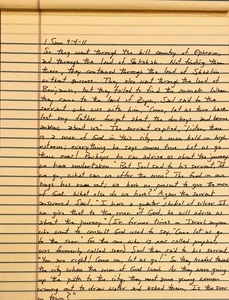
The Danger of the Perfunctory

1Sam 9:4-11
Synopsis 1Sam 9:4-11 8/29/2018
Saul was the son of Kish from the tribe of Benjamin. Kish had a herd of donkeys that broke loose. So, Kish sent Saul with a servant to search for them.
The two men searched in the tribal lands of Benjamin and Ephraim without success. Low on food, Saul started to return to Gibeah. But, because they were near to Samuel’s home, his servant suggested going to Samuel to see if the prophet could assist in their search.
Although Saul had no money to offer the prophet, the servant offered his own “quarter shekel of silver”. So the two agreed to use this money as a gift for the prophet and inquire concerning the donkeys.
Saul Was Not “All In” Kind of Guy
Saul was introduced as the son of a great man – a man with property. Kish was a successful man. And in the ancient world, a herd of donkeys was no small treasure.
So Saul was out looking for his father’s lost treasure. He obeyed. He complied. But he didn’t bring any money with him. He took only what was provided to him by his father. Even his servant carried more cash than he did.
Saul was not all in. He was ready to quit the search when he had completed what could be reasonably expected of him. In fact, his servant showed more initiative than Saul did by suggesting they visit Samuel and offering to pay for it himself.
The Danger of the Perfunctory
Doing the minimum conveys a lack of passionate commitment.
I live my life without passion when I don’t feel the intuitive desire to achieve but I do feel compelled by some sense of moral obligation to keep going.
“Be fully committed.”
I can say that without difficulty. But what if I’m not feeling motivated? And, if motivation is a felt response to value, then what can I say? I don’t value the given. So, if I can, I’ll slack. If I can’t, then I’ll do the minimum required.
But there is a way out of the perfunctory – out of the habit of doing the minimum. The trick is in learning to value what the other person values. Saul could have passionately searched for the donkeys because he valued whatever his father valued – out of love for his father. I can look deeper and see the purpose of the people and things around me and agree with God to deliver value to others by the way I respond.
It’s a measure of love. So, do it for the other.
“When you offer a blind animal for sacrifice, is there no wrong in that? When you offer a lame or sick animal, is there no wrong in that? Present it to your governor! Will he be pleased with you—or show you favor? says the LORD of hosts.” Malachi 1:8

